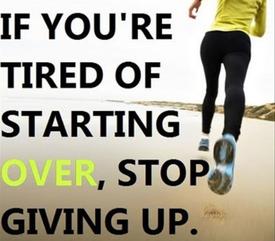Should I be eating back calories burned exercising?

miacwhite
Posts: 9 Member
It feels so wrong to eat them back after burning them off. Is this the right thing to be doing?
0
Replies
-
I have been stressing and wondering the same thing....if it would be more of a benefit to not eat the calories from exercise back. Can't wait for a good answer!0
-
I think it depends how many you're burning off. If you don't eat them back then you'll lose weight a lot quicker. If you were burning off a lot more than you're eating then you'd probably need to eat some back.
I don't eat them, though. I look at it as whatever I've burned off can cancel out something I've eaten that day. 0
0 -
No not if your trying to lose weight! The point is to burn calories so why would you then put those calories back in your body after working hard to burn them off. I dont really agree with the way mfp adds calories burned from exercise to your daily allowance. Defeats the purpose when your trying to lose weight0
-
-
No not if your trying to lose weight! The point is to burn calories so why would you then put those calories back in your body after working hard to burn them off. I dont really agree with the way mfp adds calories burned from exercise to your daily allowance. Defeats the purpose when your trying to lose weight
You need to read this link because you may not understand how MFP calculates intake recommendations and consequently your above advice is very bad for people who use MFPs defaults. http://www.myfitnesspal.com/topics/show/818082-exercise-calories-again-wtf
If you are using an external estimator for TDEE then you should not eat them back, but this distinction is important. Saying "do not eat them back" is context dependent.0 -
I eat most of mine back...my results speak for themselves...0
-
No not if your trying to lose weight! The point is to burn calories so why would you then put those calories back in your body after working hard to burn them off. I dont really agree with the way mfp adds calories burned from exercise to your daily allowance. Defeats the purpose when your trying to lose weight
Um I am going to have to disagree..... If you are using the TDEE-20% method (then do not eat them back) but if you are using the MFP method your deficit has already been created and at that point the objective shift to fueling your body for the workouts you are demanding of it... Weightloss is strictly based off your caloric intake and really does not need exercise as a subset to attain. Exercise on the other hand is another component to over all health and well being, Body composition, etc.... I have been a firm believer (using the MFP approach of course) in eating back my exercise calories and have lost a few pounds in the process.. Best of Luck OP........0 -
Hmm thanks for that! It does make sense what you have said but ive also heard other advice to the contrary ????
Now im not sure what to think?0 -
Hmm thanks for that! It does make sense what you have said but ive also heard other advice to the contrary ????
Now im not sure what to think?
Not trying to toot my own horn but take a look at the ticker of myself and dogo187 as examples when using this method from a purely weight loss perspective.... There is 461 good reasons to alteast consider the possibilities that it might hold some truth.... Best of Luck to you on your journey.....0 -
NOM NOM NOM !!!
I always eat back some of my exercise calories. If not, the next day I feel like I can eat a horse !!!0 -
Hmm thanks for that! It does make sense what you have said but ive also heard other advice to the contrary ????
Now im not sure what to think?
Did you read the link and do you understand it? If not, let me know and I will try to clarify. Basically, if you are using MFP to tell you how much to eat, you are supposed to eat back exercise calories (some/most of them). If you use a TDEE estimation tool for intake you do not eat them back.0 -
amazing explanation. it now makes full sense lol!0
-
Hmm thanks for that! It does make sense what you have said but ive also heard other advice to the contrary ????
Now im not sure what to think?
Sidesteel and Ed are correct. Listen to them!!!!0 -
It depends on what method you're using. If you're strickly doing the MFP method then yes, you should because then it brings your NET down to much if you don't. MFP is set up to not include your exercise in your eating. Which means you can eat the MFP reccommendation for food and lose weight without the exercise. When you add in the exercise, you need to eat that back otherwise you are eating below your BMR...usually WAY below and that does not give your body enough fuel to function properly or to it's fullest.
If you are doing the TDEE - 20% method then you do not eat them back because exercise is already included in that calorie allowance. Eating them back with this method is counter productive.0 -
It feels so wrong to eat them back after burning them off. Is this the right thing to be doing?
Right next to your calorie number on your diary is the word goal. A goal is something to be achieved. You eat back exercise calories using the MFP method (NEAT method) of dieting. Your NEAT (Non Exercise Activity Thermogenesis) is the calories your body burns throughout the day without any exercise.
MFP uses your NEAT to calculate your activity level...when you set your goals, your activity level should be set to a level that is appropriate without exercise. When you do this, exercise is extra and therefore MFP bumps your calorie goal up so that you still NET to your GOAL.
Failure to eat back your exercise calories may result in drastic under eating, particularly if you're at a very large calorie deficit (i.e. 1,200 calories). If your goal is 1,200 calories, you have about 800-1000 calorie deficit from your maintenance level of calories there...that's huge...when you exercise, you make that deficit even bigger which is unnecessary and potentially dangerous. Also, too large a deficit will lead to a metabolic stall...essentially your measly little calorie intake becomes your new maintenance level of calories...then you have to go to work re-booting your metabolism if you ever want to eat normally again...most people put on a few pounds in the re-boot process.0 -
Soooooooo, so, so glad I posted this topic! Thank you for explaining to me how MFP calculates calorie usage for weight loss. It makes perfect sense to me! I have just started exercising and am amazed in the difference it make in both my energy level and my disposition.
 I would hate to counteract that by not eating enough calories. I get absolutely CRAZY when I don't eat enough. Myself and my family will be glad I'm eating properly. lol 0
I would hate to counteract that by not eating enough calories. I get absolutely CRAZY when I don't eat enough. Myself and my family will be glad I'm eating properly. lol 0 -
Hmm thanks for that! It does make sense what you have said but ive also heard other advice to the contrary ????
Now im not sure what to think?
Did you read the link and do you understand it? If not, let me know and I will try to clarify. Basically, if you are using MFP to tell you how much to eat, you are supposed to eat back exercise calories (some/most of them). If you use a TDEE estimation tool for intake you do not eat them back.
Thanks that really clears up a lot an confirms I am doing the right thing.0 -
It takes me 3.5 hours of sleeping to burn off the calories from a Mars bar (no way I'm doing 50 minutes of aqua aerobics, dumb physical activity equivalent labels).
MFP uses calories burned in 24 hours minus your deficit for your daily calorie goal. Calories burned from exercise are not included because that exercise activity varies each day (unless you are using a average TDEE method that includes exercise and have customised how you use MFP to do it that way).
Your daily calorie target includes the deficit needed to meet your weekly loss target, additional exercise equals more calories to eat so the daily deficit isn't larger than your goal (250 cal/day = 0.5 lb/week, 200 exercise calories x 3 days not eaten would be 0.67 lb/week; 1,000 cal/day = 2 lb/week, 500 exercise calories x 5 days not eaten would be 2.71 lb/week). In effect, not eating back exercise calories means your deficit is larger than what is needed for the goal you set, and if you set your goal because it was "safe and sustainable" it may no longer be depending on how many calories we're talking about.0 -
This is great - really clarifies things.0 -
MFP has this cool thing called "search"

And then, yes, educate yourself with :0 -
You should be eating to replenish and refuel after each workout. I typically and snack before and immediately after all my workouts. It will usually be close to what I burned but sometimes less. It is just a good way to make sure each workout is as beneficial as possible.0
-
312 lbs lost.Hmm thanks for that! It does make sense what you have said but ive also heard other advice to the contrary ????
Now im not sure what to think?
Not trying to toot my own horn but take a look at the ticker of myself and dogo187 as examples when using this method from a purely weight loss perspective.... There is 461 good reasons to alteast consider the possibilities that it might hold some truth.... Best of Luck to you on your journey.....
Mr. Davenport, WOW, it must feel absolutely fantastic to be living life the way it should be lived and proud of all that work getting there, congratulations!0 -
Thank you SideSteel, I was trying not to eat any of them back and always feeling like I needed to, especially after a run, but now the lightbulb over my head is bright and shining! Thank you.0 -
If you're following the MFP method...then yes, you should eat them. Your calorie goal set by the program has a deficit built in. If you create too great a deficit by exercising it may not be healthy...and can lead to slower weight loss...or a complete stall. The exercise calories listed by MFP though tend to run very generous, so use a hrm or some other scale to help you stay reasonable with it. Or just eat back a percentage instead.0
-
If you can get thru the day without eating back your calories burned... DO IT!!! It helps in the end. If you're finding you need to grab them and use them, oh well that happens. Every day is different, Every day is a new day....Good Luck! :happy:0
-
I agree with all the posters who said that you should be eating most or all of them back. That is the way that MFP works---your deficit is already built-in. In order to cover any errors in weighing/measuring food or any errors in calorie-burning, I generally leave 50-100 calories uneaten---but rarely anything like 200 or more. The only exception is if it gets too late to eat more (I have reflux issues if I eat too close to bedtime). The reason why I always leave a few calories is that some of the calories in the database are a bit off. And it isn't exactly a precise science that determines how many calories you are burning. I don't have an HRM (not sure if they have ones for working out in the water anyway--which is where I do most of my cardio).
p.s. The closer you are to goal weight, the more of your exercise calories you should be eating back. If you have a lot of body fat, your body will be more apt to use fat to fuel your exercise than if you don't have much body fat. When they do studies, they have noted that obese folk start off losing quite a bit more body fat than lean tissue when they exercise. As those same individuals reduce their percentage of body fat, the more apt they are to catabolize their skeletal muscle to fuel their exercise.0 -
I posted this in another topic, it doesn't state specifics, but should give you a general idea of what is going on.Example:
TDEE: 2300
Daily Goal/amount you eat total: 1800
Deficit: 500 a day
That's a 500 calorie deficit so you're already burning more than you're consuming just by doing daily activities.
Add exercise to that and you get this:
TDEE: 2300
Daily Goal: 1800
Amount you eat: 1800
Exercise: 300
Net Amount: 1500
deficit: 800
You're now at an 800 calorie deficit. You could eat those exercise calories back, because over all your goal still puts you at a deficit. By eating them back, it will give you the 500 calorie deficit you have when you don't work out.
edit: Forgot to add
TDEE: 2300
Amount You eat: 2300
Exercise:300
Net amount: 2000
Deficit: 300
If you were to eat at maintenance and work out, then you wouldn't eat your exercise calories. This is because the exercise calories would be creating the deficit, instead of you creating it by limiting your intake.0 -
I'd eat them back simply because it gives you more to work with if you plateau or are working on those last ten pounds.0
-
I like the answer of "it depends" that was given.
Also, my thoughts are this: If you're feeling hungry then eat. If you're not hungry... don't FORCE yourself to eat back the calories that you just burned.
Some may argue that the days you don't eat back your calories you're going way too far under, but believe me, it evens out in the long run with the days that you do eat back and then some. This is what I've been following the past month or so and I've been seeing great results. I used to think too far into it that I "had" to eat back the calories... then somehow I would inevitably overeat.
Now that I"m not putting to much thought into it and just listening to my body instead, I'm seeing results.0 -
yes. what do you think the 'earned calories' are for?0
This discussion has been closed.
Categories
- All Categories
- 1.4M Health, Wellness and Goals
- 398.1K Introduce Yourself
- 44.7K Getting Started
- 261K Health and Weight Loss
- 176.4K Food and Nutrition
- 47.7K Recipes
- 233K Fitness and Exercise
- 462 Sleep, Mindfulness and Overall Wellness
- 6.5K Goal: Maintaining Weight
- 8.7K Goal: Gaining Weight and Body Building
- 153.5K Motivation and Support
- 8.4K Challenges
- 1.4K Debate Club
- 96.5K Chit-Chat
- 2.6K Fun and Games
- 4.8K MyFitnessPal Information
- 12 News and Announcements
- 21 MyFitnessPal Academy
- 1.5K Feature Suggestions and Ideas
- 3.2K MyFitnessPal Tech Support Questions



















